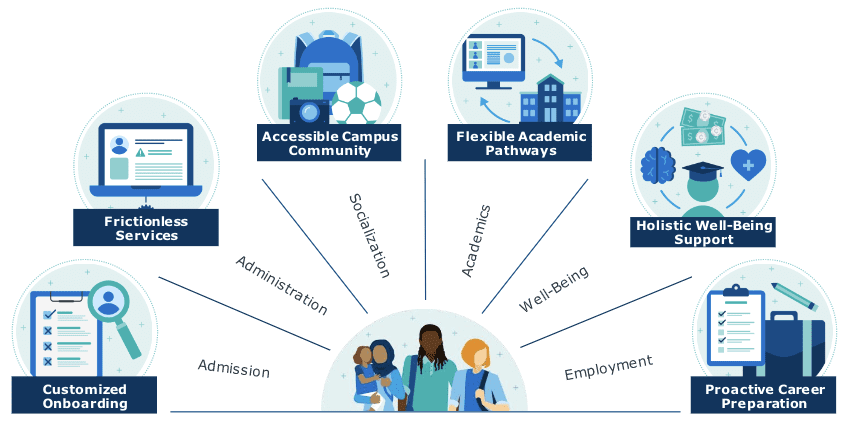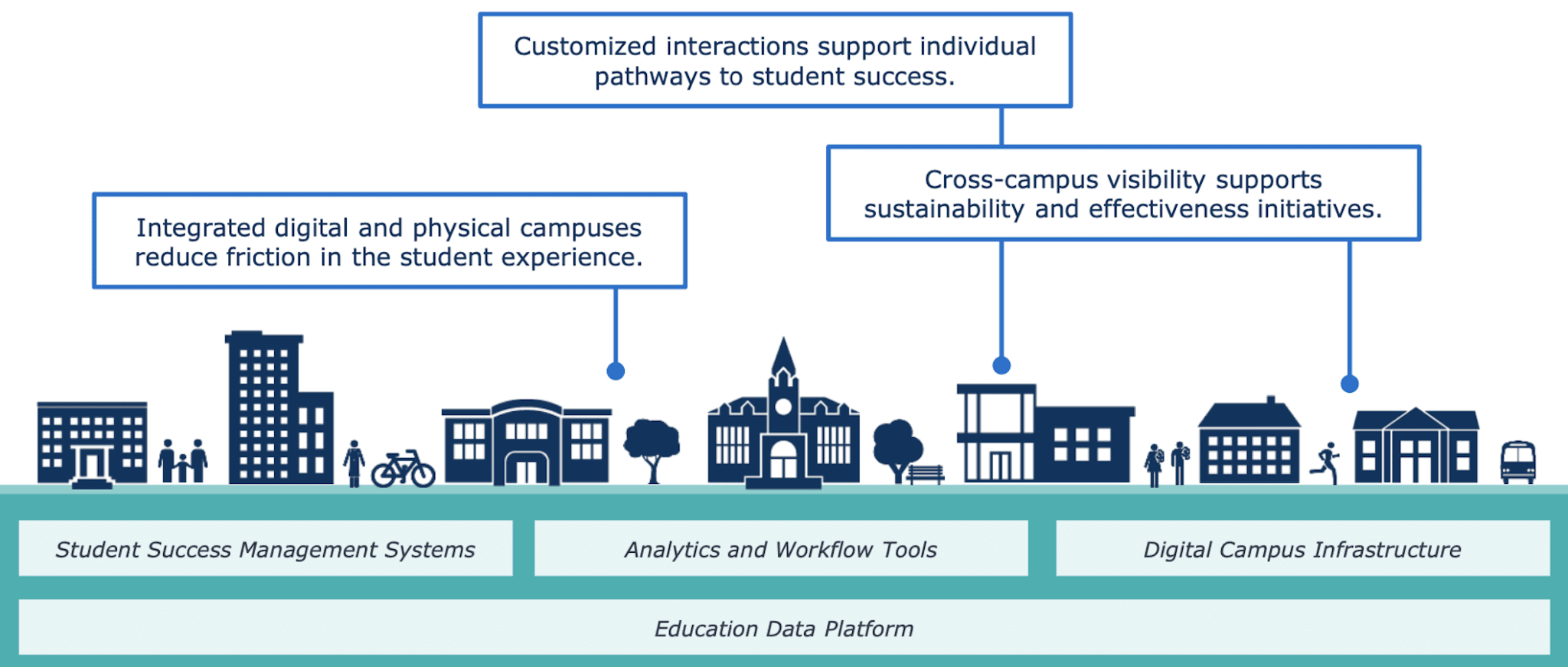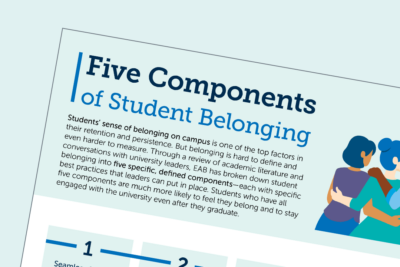The Modern Student Experience
From virtual advising to course engagement tracking, changes borne of necessity over the last two years accelerated flexibility and innovation in how colleges and universities serve and support students. For many institutions, all this change created an intense focus on the student experience—both understanding what students’ experiences are now and thoughtfully reimagining what they can look like in the future.
When it comes to designing a modern student experience, the forces that shape what students expect are at work long before they arrive on campus. The bar is now set by consumer industries, where consumers are used to unique content recommendations and seamless, multichannel customer service interactions. Across the student lifecycle and both inside and outside the classroom, the modern student experience is personalized and tech-enabled.
What Do Today’s Students Expect, and How Can You Deliver It?
Six hallmarks of a modern student experience

In this resource center
Here we’ve gathered our latest research and guidance on shaping the modern student experience, with a particular focus on academic advising and identity-conscious support. Explore below to see research on how advising is evolving, hear success stories from colleges, universities, and non-profits taking a holistic approach to student support, and learn about technology’s role in designing a modern student experience.
-
1. New approaches to advising
-
2. Identity-conscious support: campus and community insights
-
3. The role of technology
1. New approaches to advising
A modern student experience demands holistic advising that takes into account students’ career goals, life experiences, and priorities and needs outside the classroom. But while pockets of holistic advising exist at most institutions, a history of uncoordinated investments across campus means the advising experience isn’t the same for all students. Explore below for guidance on how to design more holistic and effective advising.
Resources
Blog post
are these stale debates stalling advising reform at your school?
Learn how to get past debates advising structures to create holistic advising for students.
Whitepaper
breaking the advising stalemate
Our latest advising research discusses how to assign responsibilities between faculty and professional advising functions and empower all advisors to provide truly student-centered advising.
TOOL: pages 19-20 are a worksheet to help you identify and assign advising duties.
Whitepaper
Explore the connection between early alerts and equity and learn 3 ways to increase connection and trust between students and advisors.
TOOL: page 12 is a checklist to help you write equity-based emails.
Blog post
are your emails to students limiting your equity efforts?
See 5 common mistakes you may be making in advising outreach to minoritized students-and learn what to do instead.
2. Identity-conscious support
Students are growing to expect personalized interactions and support at the same time that the demographics of higher ed are changing across the country, making it all the more vital for institutions to thoughtfully understand how to provide identity-conscious support. As student support programs grow and evolve, leaders at our partner colleges and universities-as well as non-profit organizations in higher ed-have generously shared insights gained from their work. Explore the links below for their tactical advice on improving student support.
Resources
Blog post
every student’s mental health needs are different. here’s how you can offer the right support
Alison Malmon, founder of campus mental health non-profit Active Minds, and Dr. Ruby Hayden (Vice President of Student Services) and Juliette Blank (Mental Health Counselor) of Lake Washington Institute of Technology discuss the changing campus mental health conversation and how to evolve your support.
VIDEO: Scroll to the bottom of this section to see Alison Malmon and Dr. Hayden speak at EAB’s CONNECTED student success conference in 2021.
Blog post
how to support black male student success
Dr. Roderick Heath of North Carolina Central University discusses NCCU’s African American Male Initiative and shares advice for schools developing programs to support Black male students.
Podcast
spotlight on the African American Male Initiative at NC Central
Dr. Heath discusses how he combines data, technology, and a range of motivational tactics to foster a sense of belonging for Black male students.
Blog post
5 ways to support rural student success
Recommendations from a panel on supporting rural students featuring Albert Lewis, Executive Vice President at Northwest State Community College; Dr. Heather Speed, Vice President of Student Success at Pueblo Community College; and Dr. Geoffrey Fortunato, Associate Vice President at Seminole State College.
Blog post
a common equity blindspot: what higher ed leaders need to know about serving student-parents
A Q&A with Nicole Lynn Lewis, founder of Generation Hope, a non-profit that advocates for the needs of student-parents and their children.
Podcast
it’s time to strengthen support for student-parents
David Croom of Ascend at the Aspen Institute dispels myths about student-parents and shares creative ways to provide wrap-around services.
In the videos below, Alison Malmon and Dr. Hayden discuss campus mental health at EAB’s CONNECTED student success conference in 2021. Content warning: these videos discuss self-harm and suicide.
ConnectED Stories Guest Speaker, Alison Malmon Active Minds
ConnectED Stories 2021: Ruby Hayden, Lake Washington Institute of Technology
3. The role of technology
Today’s students increasingly expect the personalized, seamless experiences they’ve grown used to in other facets of their lives. The resources in this section offer examples of modern experiences across the student lifecycle and tools to spur innovation at your institution.
Resources
Whitepaper
Designing a modern student experience
This research outlines the consumer trends shaping students’ expectations of the higher ed experience and provides examples from schools designing modern experiences. You’ll also find 3 guiding principles for your student experience work.
Whitepaper
Sustaining Student-Centric Innovation
This research explores the mandate for student-centric innovation and offers a roadmap for higher education leaders to develop a sustainable digital strategy for the years ahead.
TOOL: pages 28-29 provides a framework for building a modern technology strategy.
Blog post
How “Disney magic” can inspire higher ed to modernize the student experience
There was a time when, like higher ed today, Disney faced growing prices and waning customer satisfaction. See how they redesigned the customer experience, and what lessons can apply to higher ed.
For most institutions, approaching the work of redesigning the modern student experience means confronting a complex and fractured system of underlying campus technology. Some innovations will rely on new technologies and vendor partnerships, and others will require more reliable integrations between existing systems. This work is an opportunity to implement a technology ecosystem that can deliver enhanced experiences for the students of today and lay the groundwork to keep up with the shifting expectations of the students of the future.
Integrated Tech Works Hard Behind the Scenes on the Modern Campus
The digital ecosystem of tomorrow connects data and applications beneath the surface

More Resources

5 components of student belonging

Trends in Student Affairs Responses to Anti-DEI Legislation
